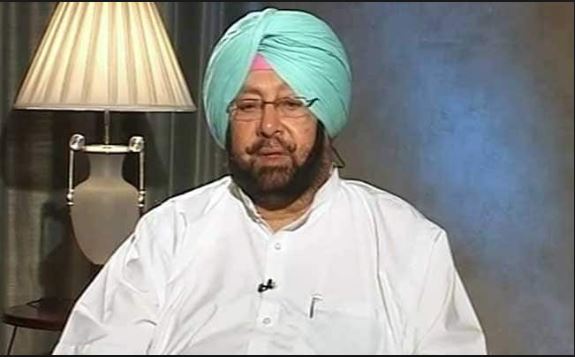
Punjab CM Captain Amarinder Singh moots Joint Operations on Inter-State Borders as part of Anti-Drug Strategy & Action Plan
Chandigarh: Expressing concern over the spread of narco-terrorism by Pakistan through various states, Punjab Chief Minister Captain Amarinder Singh on Thursday proposed joint operations on the inter-state borders, as part of a series of collaborative measures to tackle the drugs menace. In his opening remarks at the ‘2nd Regional Conference on Drug Menace – Challenges & Strategies’ here, the Chief Minister unveiled a detailed strategy and action plan for the eradication of the scourge, for consideration and implementation by all the participating states. The participating delegates included Haryana Chief Minister ML Khattar, Himachal Pradesh Chief Minister Jai Ram Thakur, Rajasthan Chief Minister Ashok Gehlot, Uttarakhand Chief Minister Trivendra Singh Rawat, besides senior officials representing Jammu and Kashmir, Delhi and Chandigarh. Pointing out that drug traffickers were not confined by national or state boundaries, Captain Amarinder said Pakistan was promoting narco-terrorism to create trouble in India, with drugs being pushed in through Uri and Kandla, among other places. Given the enormity of the problem, it was not possible for any state to tackle it alone, he said, calling for joint efforts, with a National Drugs Policy to combat the menace. Also read: Punjab CM Captain Amarinder Singh conducts aerial survey of flood-affected areas in Patiala and Sangrur Pointing to last month’s huge seizure of drugs at the Integrated Check Post at Attari (Amritsar), the Chief Minister said it had exposed the existence of an active and organized drug smuggling racket and network through the Attari trade route. Investigations had revealed the involvement of a major International drug racket based in Pakistan as well as in Afghanistan, he said, adding that the problem had nationwide ramifications, with the northern region particularly vulnerable. As part of the joint efforts, Captain Amarinder called for effective coordination and Joint operations with NCB, BSF and other central agencies, including the IB. Such joint operations should be intensified to tighten the noose against big drug smugglers/suppliers, such as those involved in importing a huge amount of drugs (heroin) across Indo-Pak border from Attari Land Port/Route, he emphasized. Calling for a crackdown on the drug factories in all the neighbouring states, he said units manufacturing illicit synthetic drugs should be properly identified for suitable action. The Punjab Chief Minister also suggested that detention proposals of big Drug smugglers/suppliers of all States be prepared u/s 3 of PIT NDPS Act, 1988. Captain Amarinder advocated fast track courts for speedy trials of NDPS offenders, especially big drug smugglers/suppliers involved in commercial quantity seizures/transactions. The matter would be taken by his government with the Hon’ble Punjab & Haryana High Court, he said, urging other states to also pursue the same. The Chief Minister urged the neighbouring states to consider the opening of a Regional Training Centre for Training of Investigators for proper investigation of NDPS cases at Chandigarh. Existing Training Infrastructure/facilities available with Punjab/Haryana and Chandigarh could be utilized for the purpose, and support could be sought from NCB and UNODC for providing Trainers/Resource persons and training material. Proposing the establishment of a Regional Drug Dependence Treatment Centre in Chandigarh Tricity area, on the lines of National Drug Dependence Treatment Centre (NDDTC) AIIMS, New Delhi, Captain Amarinder suggesting that the states jointly put the the proposal before the Government of India. In another important initiative, the Punjab Chief Minister mooted the development and implementation of an Information Sharing Platform, for real-time sharing of information, both in physical and virtual space, in view of the fact that areas near/adjoining inter-state borders invariably become sanctuaries for smugglers/gangsters/criminals. Often, drug suppliers/criminals, who are residents of adjoining States, are operating in neighbouring States, he pointed out, underlining the need for sharing of lists and morning photos of NDPS Proclaimed offenders. The Chief Minister listed building of common databases and sharing of dossiers of interstate Drug Smugglers/ traders/peddlers among the measures for tackling the problem on a war footing. He further underlined the need for sharing of information relating to Pharmaceutical Opioids and synthetic drugs, as well as their factories, and also chemists/individuals supplying them. Captain Amarinder cited some of the initiatives being taken by his government to tackle the problem of drugs in Punjab and exhorted the other states to collaborate more closely for the successful implementation of their joint strategy and action plan. The Chief Minister pointed to the success of the Special Task Force (STF) set up by his government in April 2017, and the Comprehensive Action against Drug Abuse (CADA) strategy being implemented in Punjab through a three-pronged approach based on a balanced emphasis on Enforcement-Deaddiction-Prevention (EDP). Enforcement measures in Punjab, he said, have focused on breaking the supply chain of narcotics by increasing security and vigil including areas along the international border through tactical reinforcement behind BSF deployment. Further, action has been taken against drug traffickers at all levels in the supply chain for disruption of the distribution network. Special emphasis is being placed on the recovery of heroin. Since April 1, 2017, after his government took charge, 27,799 cases had been registered under the NDPS Act, with 33,756 persons arrested, said Captain Amarinder, adding that 780 kgs of heroin and 1189 of opium, along with large quantities of other drugs, had been seized. Captain Amarinder also spoke about the de-addiction and rehabilitation measures in place, in addition to the Outpatient Opioid Assisted Treatment (OOAT) approach, with 185 OOAT clinics providing free treatment. The Chief Minister shared with the conference the progress of the Buddy and DAPO programmes launched by his government as part of the preventive strategy against drugs. Captain Amarinder underscored the importance of closer engagement, among the states, at various levels, including the level of the Political Executive, Home Secretaries, DGPs, and Health Secretaries. -PTC News
